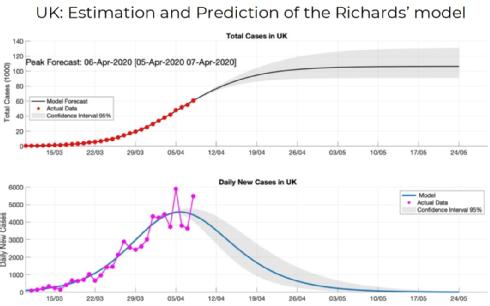COVID-19 cases in the UK could have peaked this week, according to new research.
- To read the full paper click here.
T he UK could have zero new cases as early as 10th May, but no later than the end of May, new research conducted by the University of Warwick suggests.
he UK could have zero new cases as early as 10th May, but no later than the end of May, new research conducted by the University of Warwick suggests.
As the UK continues its lockdown, the question for policymakers and public alike is when the virus will start to slow. The Government has recently postponed discussion about when lockdown restrictions might be eased, saying it is too early to tell when the peak of the virus could be reached.
However, new findings from Dr Roberto Pancrazi at CAGE and the Department of Economics at the University of Warwick, estimates that the virus could have peaked this week. Though the trajectory of the virus has some regional variation.
Dr. Pancrazi has applied the Richards phenomenological model for predicting the pattern of an outbreak to the case of the UK. This model has been used to assist the trajectory of previous outbreaks including H1N1, SARS, Ebola and the COVID-19 outbreak in China.
Key findings are:
· Cases in the UK are likely to peak this week. In the next 1-3 weeks the epidemic could be halfway on its decaying path.
· The UK could see zero new reported cases as early as 10th May, but no later than the end of May.
· Scotland and Northern Ireland are on a faster track to the end of the epidemic and will see a swift drop in cases after the peak is reached.
· The UK and Wales are on a similar course.
· In regions across England there is some variation. The North West is likely to see cases drop much more quickly than the South East, for example.
· Taking Italy as a comparison (which is thought to be around two weeks ahead of the UK) the data show that restrictions put in place in March had an effect, and the epidemic is now waning.
The model takes into account official statistics of new cases and assumes that the lockdown measures will continue. When applied to data from Italy, which is thought to be around 2 weeks ahead of the UK, it shows with some certainty, that the most affected regions of the country are now in the decaying phase of the epidemic. The message is that the lockdown measures in Italy have been working, and, soon, they should start working for the UK too.
Commenting on the research Dr. Pancrazi said:
“Understanding and predicting the evolution of outbreaks is crucial for policymakers, as they face the trade-off between limiting social interaction and avoiding a further spread of the disease. Using official data on new cases for the four nations and England’s NHS regions, I estimate a Richards’ phenological model to forecast their Covid-19 evolution. I also adopt a correction that controls for the large variability in the number of daily test, which, obviously, affects the number of official daily cases.
“For the UK, overall it is likely that we are approaching the peak of the epidemic, which the model pinpoints during the current week. This timeline holds even when accounting for the large variability of daily tests. It will then take around one to three weeks before the epidemic shows half-way on the decaying path. The dynamics of the UK path are driven by England, particularly the London area, and Wales, the regions of which share a very similar predicted timeline. Importantly, these predictions are conditional on strict social distancing: as they are likely to be imperfect, the day of the peak might be delayed by few days. In the case of Italy, the final estimated peak was 5 days later than the one originally estimated.”
9 April 2020
ENDS
Notes:
Publication
Roberto Pancrazi, ‘Estimating and Forecasting Covid-19 Evolution in the UK and its Regions: a Brief Note’, CAGE Briefing Note no.20
About the Author
Roberto Pancrazi is Associate Professor at the University of Warwick
About CAGE
CAGE is a research centre based in the department of Economics at the University of Warwick. We conduct independent policy-driven research informed by culture, history and behaviour. Our aim is to move beyond traditional measures of economic success to consider broader influences on global prosperity; from happiness and cultural attitudes to voter preferences and political institutions. We analyse historical and contemporary data to draw out lessons for modern policy. CAGE is supported by the Economic and Social Research Council (ESRC).
Contacts:
- Peter Dunn – Director of Press and Media Relations, University of Warwick – E: J.Dunn@warwick.ac.uk
- Jane Snape - Project Manager, CAGE Research Centre – E: Snape@warwick.ac.uk
- Tom Frew – Senior Press and Media Relations Manager, University of Warwick – E: t.frew@warwick.ac.uk
- Stephanie Seavers - Communications Manager, CAGE Research Centre – E: seavers@warwick.ac.uk
